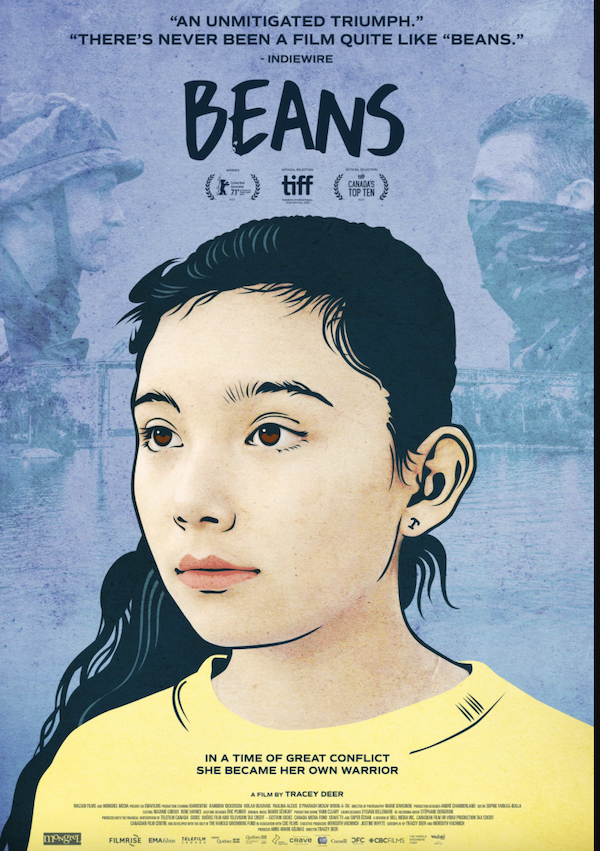Beans: A Different Coming-of-Age Story

Inspired by true events, Tracey Deer’s Beans is a powerful and impassioned coming-of-age story set amid a recent violent chapter of Canadian history.
The 1990 Oka Crisis was a land dispute between the Mohawk community and the mostly white government of Oka, Quebec, over plans for a sacred burial ground to be turned into a golf course. An intense 78-day confrontation ensued, some of which is included in the film via archival footage. Deer, a Mohawk who was inspired by her own memories of the time, instills her film with scenes and emotions that are both tender and tough, which makes for a particularly engaging experience.
At the start of the film, smart, sensitive 12-year-old Tekahentakwa, nicknamed Beans (beautifully portrayed by Kiawentiio) and her mom Lily (Rainbow Dickerson, also excellent) travel from their home on the Kahnawá:ke Mohawk Reserve to apply to a fancy school in town. (In an uncomfortable moment, the white administrator tries repeatedly and unsuccessfully to pronounce “Tekahentakwa.”) Beans’ father is against the whole idea, but Lily is adamant that their daughter pursue an excellent education. The family is rounded out by young Ruby (Violah Beauvais), Beans’ frequent companion and a classic little sister sidekick.
Dad becomes involved in the protests against the golf course supporters, which soon becomes a standoff: In retaliation for the Mohawks’ blockade of a bridge that connects the community with Montreal, local authorities cut off the reserve from supplies, including food.
When Lily takes girls into town by boat to buy food, an ugly scene plays out in the supermarket. There are several scenes of hateful white bigotry, which have a crushing effect on Beans and escalate the film’s tension. The animosity against the Mohawks is palpable, underscored by interview clips from actual news reports of the time. In return, some of the Mohawk men curse and threaten anyone attempting to cross the bridge. Real footage of the confrontation is interspersed throughout, with testimony from people on both sides (sometimes in French). Apparently, we in the States don’t have a monopoly on North American bigotry.
At first, Beans tries to keep the situation at bay psychologically, pretending with Ruby that they’re eating ice cream and other treats instead of oatmeal. Eventually she seeks out a tough older local, April (Paulina Alexis), under whose tutelage she shops for trendy clothes and learns to fight. She practices cursing in the mirror, before doing it in real life. Her boldness is admired by April’s brother Hank and soon there is young (too young, in Beans’ case) romance afoot.
Meanwhile, we can’t help but worry about her transformation into an angry, unthinking girl; we know that this can have terrible consequences for the rest of a young person’s life, especially someone in her position.
Also worrisome is the escalating conflict, despite efforts on the part of the tribe’s women try to diffuse tense confrontations. Some of the reserve’s women and children go “on vacation” to a motel to get out of the hot spot. April and Hank are there too, however, and in a bid to impress, Beans starts a fight and completely loses control. Poor pregnant Lily (the true badass of the movie) takes the kids home. Again, suspense builds as they meet obstacles on the way.
After confronted with an unreasonable demand by Hank (to put it mildly), Beans is left feeling completely alone.
Though situations both large and personal eventually get resolved, it was sure tough getting there. And despite a few scenes that are reminiscent of typical adolescent angst (mainly involving interactions with tough kids), this is not a typical film about a young girl’s rebellious coming of age. The film’s pointed POV, raw emotion and rough situations make it memorable and powerful, as do the performances of Kiawentiio and Dickerson. It’s impossible to watch Beans without feeling a wealth of emotions, which is pretty great in itself.
Beans opens in select theaters and On Demand this Friday, November 5.
—Marina Zogbi


